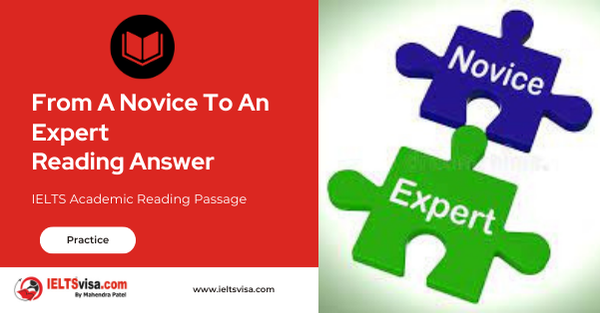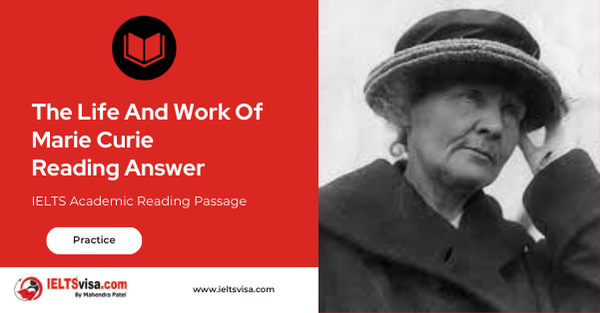From A Novice To An Expert Reading Answer
IELTS Academic Reading Passage
Expertise is commitment coupled with creativity. Specifically, it is the commitment of time, energy, and resources to a relatively narrow field of study and the creative energy necessary to generate new knowledge in that field. It takes a considerable amount of time and regular exposure to a large number of cases to become an expert.
A
An individual enters a field a study as a novice. The novice needs to learn the guiding principles and rules of a given task in order to perform that task. Concurrently, the novice needs to be exposed to specific cases, or instances, that test the boundaries of such heuristics. Generally, a novice will find a mentor to guide her through the process. A fairly simple example would be someone learning to play chess. The novice chess player seeks a mentor to teach her the object of the game, the number of spaces, the names of the pieces, the function of each piece, how each piece is moved, and the necessary conditions for winning or losing the game.
B
In time, and with much practice, the novice begins to recognize patterns of behavior within cases and, thus, becomes a journeyman. With more practice and exposure to increasingly complex cases, the journeyman finds patterns not only with cases but also between cases. More importantly, the journeyman learns that these patterns often repeat themselves over time. The journeyman still maintains regular contact with a mentor to solve specific problems and learn more complex strategies. Returning to the example of the chess player, the individual begins to learn patterns of opening moves, offensive and defensive game-playing strategies, and patterns of victory and defeat.
C
When a journeyman starts to make and test hypotheses about future behavior based on past experiences, she begins the next transition. Once she creatively generates knowledge, rather than simply matching superficial patterns, she becomes an expert. At this point, she is confident in her knowledge and no longer needs a mentor as a guide – she becomes responsible for her own knowledge. In the chess example, once a journeyman begins competing against experts, makes predictions based on patterns, and tests those predictions against actual behavior, she is generating new knowledge and a deeper understanding of the game. She is creating her own cases rather than relying on the cases of others.
The Power of Expertise
D
An expert perceives meaningful patterns in her domain better than non-experts. Where a novice perceives random or disconnected date points, an expert connects regular patterns within and between cases. This ability to identify patterns is not an innate perceptual skill; rather it reflects the organization of knowledge after exposure to and experience with thousands of cases. Experts have a deeper understanding of their domains than novices do, and utilize higher-order principles to solve problems. A novice, for example, might group objects together by color or size, whereas an expert would group the same objects according to their function or utility. Experts comprehend the meaning of data and weigh variables with different criteria within their domains better than novices. Experts recognize variables that have the largest influence on a particular problem and focus their attention on those variables.
E
Experts have better domain-specific short-term and long-term memory than novices do. Moreover, experts perform tasks in their domains faster than novices and commit fewer errors while problem solving. Interestingly, experts go about solving problems differently than novices. Experts spend more time thinking about a problem to fully understand it at the beginning of a task than do novice, who immediately seek to find a solution. Experts use their knowledge of previous cases as a context for creating mental models to solve given problems.
F
Better at self-monitoring than novices, experts are more aware of instances where they have committed errors or failed to understand a problem. Experts check their solutions more often than novices and recognize when they are missing information necessary for solving a problem. Experts are aware of the limits of their domain knowledge and apply their domain’s heuristics to solve problems that fall outside of their experience base.
The Paradox of Expertise
G
The strengths of expertise can also be weakness. Although one would expect experts to be good forecasters, they are not particularly good at making predictions about the future. Since the 1930s, researchers have been testing the ability of experts to make forecasts. The performance of experts has been tested against actuarial tables to determine if they are better at making predictions than simple statistical models. Seventy years later, with more than two hundred experiments in different domains, it is clear that the answer is no. if supplied with an equal amount of data about a particular case, an actuarial table is as good, or better, than an expert at making calls about the future. Even if an expert is given more specific case information than is available to the statistical model, the expert does not tend to outperform the actuarial table.
H
Theorists and researchers differ when trying to explain why experts are less accurate forecasters than statistical models. Some have argued that experts, like all humans, are inconsistent when using mental models to make predictions. A number of researchers point to human biases to explain unreliable expert predictions. A number of researchers point to human biases to explain unreliable expert predictions. During the last 30 years, researchers have categorized, experimented, and theorized about the cognitive aspects of forecasting. Despite such efforts, the literature shows little consensus regarding the causes or manifestation of human bias.
Questions 14-18
Complete the flow chart.
Choose NO MORE THAN THREE WORDS from the passage for each answer.
Write your answers in boxes 14-18 on your answer sheet.
|
From a novice to an expert |
|
|
Novice: ↓ |
needs 14 ……………… and ……………… to perform a given task; exposed to specific cases; guided by a 15 ………………. Through learning |
|
Journeyman ↓ |
starts to identify 16 ……………… within and between cases; often exposed to 17 ……………… cases; contacts a mentor when facing difficult problems |
|
Expert |
Create predictions and new 18 ……………….; performs task independently without the help of a mentor |
Questions 19-23
Do the following statements agree with the information given in Reading Passage 2?
In boxes 19-23 on your answer sheet, write
TRUE if the statement is true
FALSE if the statement is false
NOT GIVEN if the information is not given in the passage
19 Novices and experts use the same system to classify objects.
20 A novice’s training is focused on memory skills.
21 Experts have higher efficiency than novices when solving problems in their own field.
22 When facing a problem, a novice always tries to solve it straight away.
23 Experts are better at recognizing their own mistakes and limits
Questions 24-26
Complete the following summary of the paragraphs of Reading Passage 2.
Using NO MORE THAN TWO WORDS from the Reading Passage for each answer.
Write your answers in boxes 24-26 on your answer sheet.
Though experts are quite effective at solving problems in their own domains, their strengths can also be turned against them. Studies have shown that experts are less 24………………….. at making predictions than statistical models. Some researchers theorise it is because experts can also be inconsistent like all others. Yet some believe it is due to 25………………., but there isn’t a great deal of 26………………… as to its cause and manifestation.

Solution For: From A Novice To An Expert Reading Answer
14. guiding principles and rules
15. mentor
16. Patterns of behavior/patterns
17. complex
18. knowledge
19. FALSE
20. NOT GIVEN
21. TRUE
22. TRUE
23. TRUE
24. accurate
25. human bias
26. consensus
Review and Practice
- Regularly practice with IELTS reading samples and time yourself to get used to the pressure of the exam.
- Review your mistakes to understand where you went wrong and how to avoid similar errors in the future.
Our Books
Master IELTS Speaking Part 1
IELTS Writing Task 1 Book
IELTS Writing Task 2 Book
From A Novice To An Expert Reading Answer Explanation
Comin Soon
Practice IELTS Other Modules
IELTS Listening
The IELTS Listening test assesses how well you can understand spoken English in various contexts. It lasts about 30 minutes and is divided into four sections with a total of 40 questions. The listening tasks become increasingly difficult as the test progresses.
IELTS Academic Reading
The IELTS Academic Reading section assesses your ability to understand and interpret a variety of texts in academic settings. It is designed to evaluate a range of reading skills, including skimming for gist, reading for main ideas, reading for detail, understanding inferences, and recognizing a writer's opinions and arguments.
IELTS Speaking
The IELTS Speaking test assesses your ability to communicate in English on everyday topics. It lasts 11-14 minutes and consists of three parts: introduction, cue card, and a discussion based on the cue card topic.
IELTS General Reading
IELTS General Reading tests your ability to understand and interpret various types of texts. Here are some key areas and types of content you can expect to encounter in the reading section, along with tips for effective preparation.
IELTS Academic Writing Task 1
In IELTS Academic Writing Task 1, you are presented with a visual representation of information, such as graphs, charts, tables, or diagrams, and you are required to summarize, compare, or explain the data in your own words.
IELTS General Writing Task 1
In IELTS General Writing Task 1, you are required to write a letter based on a given situation. The letter can be formal, semi-formal, or informal, depending on the prompt. Here’s a breakdown of the key components to include in your letter
IELTS Academic Writing Task 2
In IELTS Academic Writing Task 2, you are required to write an essay in response to a question or topic. Here’s a guide to help you understand the essential elements of this task
IELTS Exam Tips
To succeed in the IELTS exam, practice regularly, familiarize yourself with the test format, improve your vocabulary, develop time management skills, and take mock tests to build confidence.
Grammer for IELTS
Grammar is the foundation of effective communication in English. Understanding tense usage, subject-verb agreement, and sentence structure enhances clarity and coherence in writing and speaking.
Vocabulary for IELTS
Vocabulary plays a crucial role in the IELTS (International English Language Testing System) exam, especially in the Speaking and Writing sections. Here’s an overview of why vocabulary is important and how it impacts your performance
RECENT IELTS SAMPLES QUESTIONS AND ANSWERS
The Life And work Of Marie Curie Reading Answer
Marie Curie is probably the most famous woman scientist who has ever lived. Born Maria...
Becoming An Expert Reading Answer
A Expertise is commitment coupled with creativity. Specifically, it is the commitment of...
STUDY CENTRE COURSES Reading Answer
SELF-STUDY TIPS AHowever difficult you find it to arrange your time, it will pay off in the...
The Extrinct Grass In Britain Reading Answer
A The British grass interrupted brome was said to be extinct, just like the Dodo. Called...
Morse Code Reading Answer
A. A new satellite-based system is being implemented to replace Morse code for sending...
Magnetic Therapy Reading Answer
AMagnetic therapy, which is a $5-billion market worldwide, is a form of alternative medicine...













